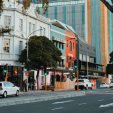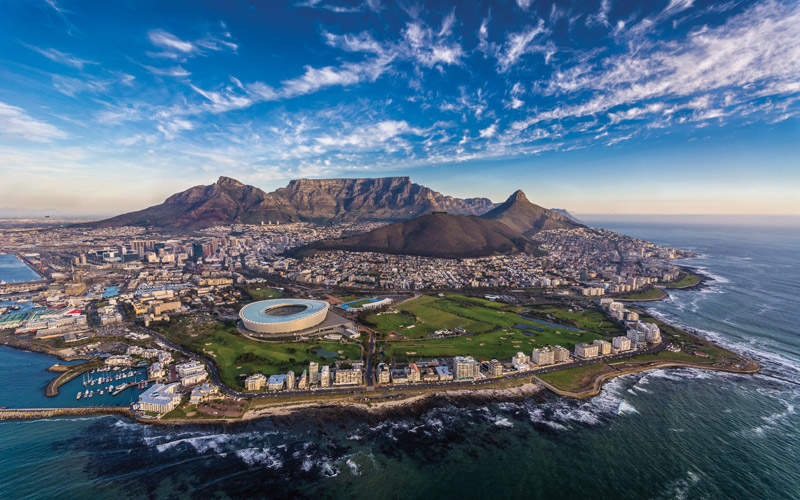Yes, there’s wine, but also art, yoga, cooking classes & kudu macarons
Q&A with Lyall Sprong from ThingKing about #ANOTHERLIGHTUP
Find out the story behind the mural on De Waal Drive and how the design is being used to help make a difference
Despite its beauty and seemingly idyllic lifestyle opportunities, Cape Town is still very much a city that is plagued by many social and structural inequalities – there are the haves and there are the have-nots, and sometimes it is easy to forget about “the other side” because of the vast differences there are between these two realities. So, in an attempt to challenge this disconnection, Lyall Sprong from designer-maker consultancy ThingKing, Mother City street artist Faith 47 and the Design Indaba Trust have teamed up for the #ANOTHERLIGHTUP, a project that uses art as a tool for crowd funded community engagement through a piece titled The Harvest.
The multi-story mural, which features a number of LED lights, can be seen from De Waal Drive, outbound from Cape Town on the wall of a residential building in District Six. Thanks to a visual feedback loop, the artwork lights up every time enough money is raised to install a street light in Monwabisi Park, Khayelitsha (specifically a 700m stretch of road that leads to the area’s community taps). Thus, the creative endeavour serves as visual reminder that there are people who live without the luxury of light, which, especially in the case of Monwabisi, is a massive public safety concern.
We spoke to Lyall about the project, the practical application of design for good, and the Thundafund campaign, which runs until midnight on Sunday, 3 August 2014.
Q&A WITH LYALL SPRONG FROM THINGKING AND #ANOTHERLIGHTUP
So how did the idea for #ANOTHERLIGHTUP come about?
Lyall: Faith47 approached us, and Ravi [Naidoo] from Design Indaba had said he would fund all the costs of doing something interesting on the wall, but they were looking for something more than just a piece of street art. So we had multiple conversations and then went to the wall to see what we could do. Faith doesn’t really like to talk about what the wall is about exactly but she spoke about this motherly presence, and so we thought about referencing all sorts of statistics through the use of light.
We eventually came up with this idea of lighting as a very simple thing to increase safety, which comes out of VPUU’s (Violence Prevention through Urban Upgrading) initiative mandate, and so we approached them and asked if there were any areas that they would like to light up and we decided to link it. It’s a balance – it has to be meaningful and conceptually sound, but it also has to be accessible enough that the public can get interested.
What has the response been so far?
L: Incredibly positive, it’s something that seems to have captured people’s imaginations although we haven’t raised nearly as much funds as we were hoping to. People consume it as an idea quickly, but that doesn’t necessarily translate into action. So I think the next big thing, a very important thing for me, is to engage with the community where it’s happening.
So how does this Thundafund campaign work? What types of things will people get back?
L: Some are simple, like if you donate R100 you get a mention on the website, and then there’s another tier where we want to organise some kind of tour just to offer people an opportunity to go and see the space. We did something just with street art in Cape Town because the type of people who tend to be interested in this project also tend to be familiar with Faith’s work or street art in general, and another tier is more to do with what ThingKing does – it’s a really rad piece of technology that’s a new individualised implementation of the same lights we used on the wall.
And what have you learnt during this process because this isn’t really your forte is it?
L: It’s been a very interesting process to get involved in to be honest. My field is design, which is sometimes about systems and how people come together, but this is more a mainstream thing that's trying to talk to everyone.
I think that the most important thing for me is that first and foremost it’s a beautiful piece of art and the secondary thing is the opportunity to experiment with raising money and aligning the city with something else. We are kind of inundated with opportunities to provide or donate, but I think that can also feel kind of disabling. I think sometimes people make up reasons why they’re not giving or contributing, but that’s not the real reason. It’s more like a disbelief in your own efficacy or you just don’t believe in the capacity of aid.
It could just be a case of dealing with mass apathy, which is a great thing to observe. So those kind of intangible benefits of the project, although they might not leave us feeling as fuzzy and warm as we’d like, can be as useful.
Then is it realistic to imagine design as transformative tool for good?
L: Design carries quite a heavy burden – there’s a lot expected of it and it all seems wishy-washy. But design is just planning, so you could rephrase that and ask what can planning do for good.
I think our ultimate aim is going to be to connect people somehow, and things that draw people together or help people constantly think about the sense of fellowship with other Capetonians are good starting points. Ultimately what it comes down to is transforming individuals that are part of the process.
So this whole design thing is more than just a buzzword or the phrase of the year?
L: Of course there is a risk that this does become that kind of thing that is just another group of advantaged people hatching a scheme that sounds nice but doesn’t have any concrete meaningful life. But I think on some level it might open up a door to similar ways of thinking about public space and linking the city to the veins that are just outside of the main centre.
From my experience, it’s not really even a measure of whether it works or not because there can be some other factors that make things work or not, but it was a good learning process for the people involved. Everything that one does is about your own development in a way, and sometimes you have to put something out there to understand yourself better. It’s the only way to move forward.
HOW TO GET INVOLVED
Visit Anotherlightup.com to find out more about the project and how you can get involved, or go to Thundafund.com to see the different tiers for donation. The Harvest can be seen from De Waal Drive and lights up briefly whenever someone tweets #ANOTHERLIGHTUP. The bulbs stay on for an entire day whenever enough money is raised for another light in Monwabisi.
The Thundafund campaign will be live until midnight on Sunday, 3 August 2014.
Photos by Rowan Pybus
---
Use our events section for an up-to-date overview of happenings in Cape Town. Also, don’t forget to subscribe to our newsletter and if you have a smart phone, add m.capetownmagazine.com to your home screen for quick access on the go!
Follow us on Twitter, like us on Facebook, join our Google+ circle, connect with us on LinkedIn, check out our photos on Instagram and follow our Pinterest boards for updates on what’s happening in and around the Mother City!








